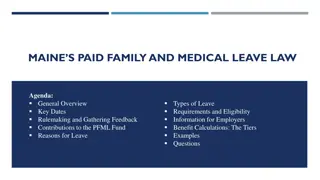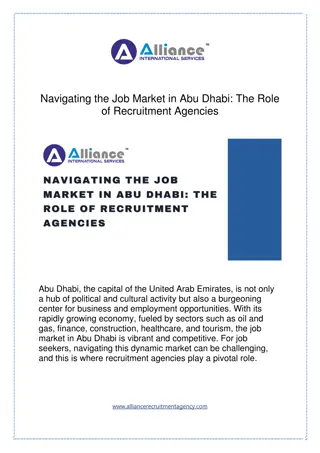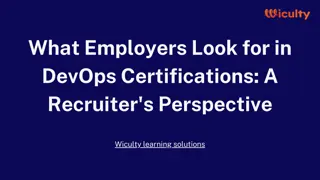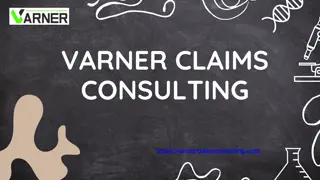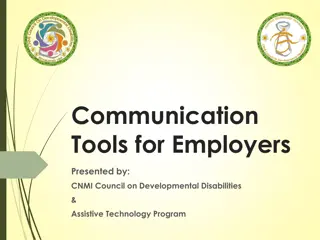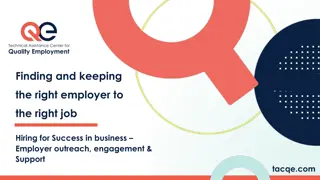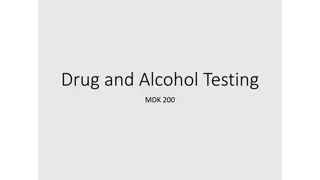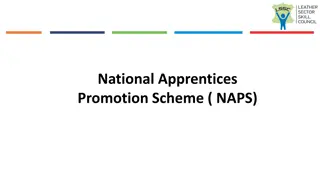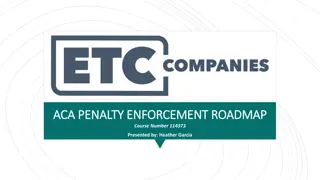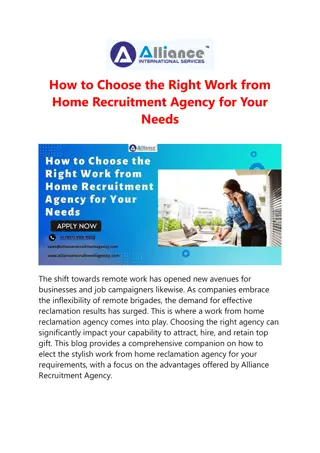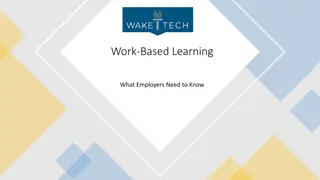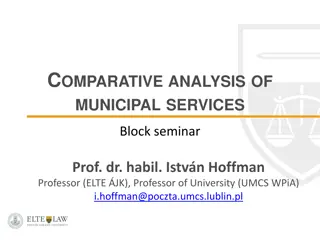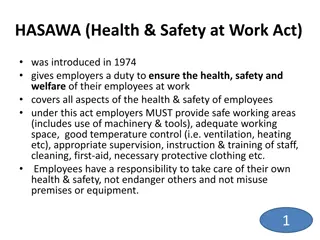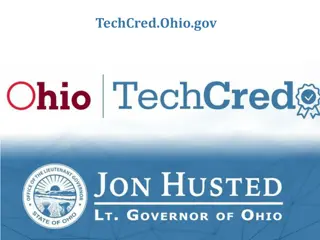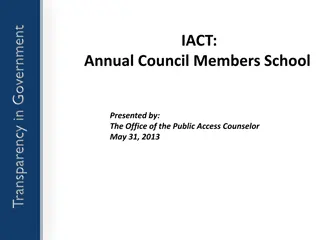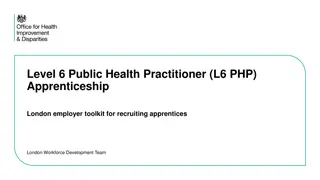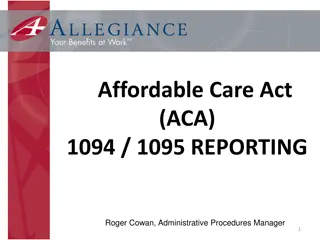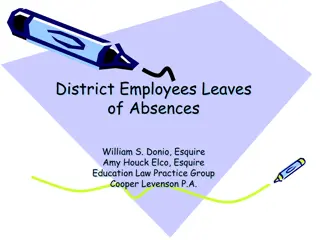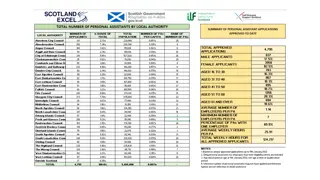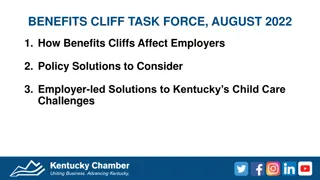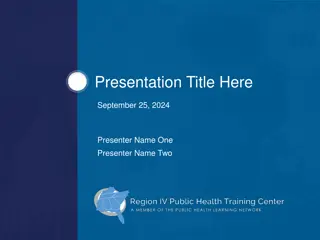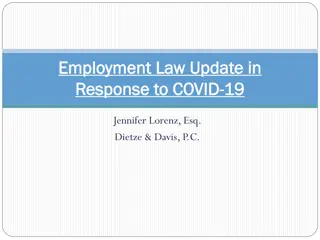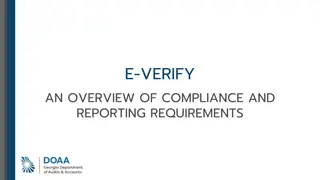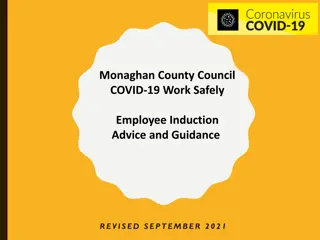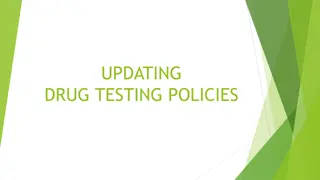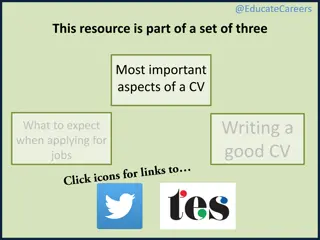Ergonomics Training Requirements for Minnesota Employers
Employers in Minnesota must comply with statutory training requirements related to ergonomics and safety committees. Training covers topics such as safety committee establishment, ergonomics programs, reporting procedures for injuries, and controls for ergonomic hazards. Non-compliance may result in
0 views • 53 slides
Maine's Paid Family and Medical Leave Law Overview
Maine's Paid Family and Medical Leave (PFML) law, effective October 25, 2023, provides up to 12 weeks of paid leave per benefit year for various reasons. Employers and employees contribute to the PFML fund, with key dates and rulemaking processes outlined for implementation. Contributions are calcul
1 views • 14 slides
Comprehensive Telecommuting Training for Employees
Introduction to telecommuting training for employees, covering topics such as defining telecommuting, benefits to employees and employers, criteria for selecting telecommuting employees, application process, and tips for effective telecommuting. The content emphasizes the advantages of telecommuting
2 views • 21 slides
CCPHIT Workforce Development Program in California
The CCPHIT Workforce Development Program in California, supported by ONC under grant number 90PH0006/01-05, aims to develop public health informatics and technology curricula to meet the informatics needs of public health employers. Led by Dr. Kamiar Alaei and Gora Datta, the program focuses on crea
0 views • 15 slides
Understanding Religious Accommodation in the Workplace
Title VII of the Civil Rights Act of 1964 mandates employers to reasonably accommodate employees' religious beliefs unless it imposes undue hardship. This includes adjustments to the work environment to allow the practice of beliefs. The law also prohibits discrimination and harassment based on reli
4 views • 20 slides
Understanding Form I-9: Purpose and Completion for Employers
Form I-9 is crucial for verifying the identity and employment authorization of new employees in the United States. Employers have specific responsibilities, such as providing instructions, completing sections within designated timelines, and retaining completed forms. It is essential to ensure prope
4 views • 27 slides
Effective Discipline Program and Documentation
An effective discipline program is essential for both employers and employees to address shortcomings and enhance workforce productivity. Proper documentation of disciplinary actions can also safeguard employers during difficult decisions. The program covers principles of disciplinary action, when t
4 views • 27 slides
Navigating the Job Market in Abu Dhabi The Role of Recruitment Agencies.docx
Navigating the job market in Abu Dhabi can be challenging due to its competitive and dynamic nature. Recruitment agencies like Alliance Recruitment Agency play a crucial role in bridging the gap between job seekers and employers, providing expert guidance, access to hidden opportunities, and streaml
0 views • 8 slides
What Employers Look for in DevOps Certifications A Recruiter's Perspective
DevOps certifications play a crucial role in the hiring process, serving as a key indicator of a candidate\u2019s skills and knowledge. However, from a recruiter's perspective, the value of these certifications goes beyond the certificate itself. Employers look for certifications that are relevant,
17 views • 8 slides
Understanding Legal Solutions With Employer Unable To Accommodate
In today's complex employment landscape, ensuring fair treatment and compliance with legal obligations is crucial for both employers and employees. When Employers Unable To Accommodate certain needs or requests from their workforce, navigating the legal terrain becomes even more critical. At Varner
6 views • 5 slides
Effective Communication Strategies for Employers
Discover communication tools and assistive technology to enhance interactions with individuals with disabilities. Engage in activities to improve communication skills and learn about assistive technology categories. Gain insights on areas where assistive technology can be applied and access practica
1 views • 9 slides
Navigating Employment Opportunities and Challenges for Individuals with Disabilities
This presentation explores strategies for finding and retaining the right employers for individuals with disabilities. It covers topics such as hiring for success in business, employer outreach, engagement, and support. The Vocational Rehabilitation Technical Assistance Center for Quality Employment
0 views • 14 slides
Comprehensive Guide to Drug and Alcohol Testing Regulations for Marine Employers
This comprehensive guide provides detailed information on the regulatory requirements for drug and alcohol testing in the marine industry. It covers relevant sections of the Code of Federal Regulations (CFR), definitions of key terms, chain of custody procedures, and important roles such as Drug and
1 views • 15 slides
National Apprentices Promotion Scheme (NAPS): Enhancing Skill Development and Employment Opportunities
National Apprentices Promotion Scheme (NAPS) is an initiative by the Ministry of Skill Development & Entrepreneurship to promote apprenticeship training. It offers benefits to both employers and candidates, helping bridge the skill gap and foster career growth. Employers receive financial support, w
5 views • 7 slides
Illinois Sexual Harassment Prevention Training Version 2.0 by State of Illinois Department of Human Rights
Illinois Sexual Harassment Prevention Training Version 2.0 by State of Illinois Department of Human Rights emphasizes the prohibition of sexual harassment in Illinois, outlining the responsibilities of employers and providing information on what constitutes sexual harassment under the Illinois Human
0 views • 39 slides
Understanding ACA Penalty Enforcement Roadmap for Employers
This material provides insights on ACA penalty enforcement for Applicable Large Employers (ALEs) under the Affordable Care Act (ACA). It covers ALE obligations, employer mandates, health coverage reporting, penalties for non-compliance, and potential changes in reporting requirements. Emphasis is pl
0 views • 13 slides
How to Choose the Right Work from Home Recruitment Agency for Your Needs
A work from home recruitment agency specializes in connecting employers with campaigners for remote positions. These agencies work their moxie to navigate the complications of remote hiring, icing that both employers and job campaigners find the righ
0 views • 8 slides
Maximizing Work-Based Learning Opportunities at Wake Tech for Employers
Employers at Wake Tech can benefit from work-based learning programs by reducing recruiting costs, accessing a skilled labor pool, and attracting new talent. Students gain practical work experience in various fields, enhancing their employability and preparing them for the job market. Employers can
1 views • 12 slides
Understanding Section 125 Cafeteria Plans in Minnesota
Learn about Section 125 Cafeteria Plans in Minnesota, how they benefit both employees and employers, and the requirement for employers under Minnesota law to offer such plans. Discover how these plans allow employees to purchase health coverage with pre-tax dollars, reduce taxable income, and increa
0 views • 17 slides
Comparative Analysis of Municipal Services in Public Sector Evolution
Explore the evolution and role of public services in the municipal sector through a comparative analysis presented in a block seminar by Prof. István Hoffman. Delve into the general theory of public services, the traditional and changing approaches of public administration, and government expenditu
0 views • 74 slides
Health and Safety Regulations in the Catering Industry
The Health and Safety at Work Act (HASAWA) introduced in 1974 places a duty on employers to ensure the health, safety, and welfare of their employees at work. This act covers various aspects such as providing safe working areas, adequate lighting, sufficient ventilation, proper maintenance of equipm
0 views • 23 slides
Overview of TechCred Program in Ohio
TechCred.Ohio.gov provides information about the TechCred program in Ohio, which aims to help employers find the talent they need and offer opportunities for Ohioans to enhance their skills. The program has funded thousands of credentials for employers and individuals, with a focus on industry-recog
0 views • 15 slides
Understanding Indiana's Open Door Law: Public Access and Governance
The Indiana Open Door Law ensures transparency in public agency actions by requiring open meetings unless exempted. The Public Access Counselor provides guidance on public access laws, emphasizing the importance of public information accessibility. Meetings under the law must be open to the public,
0 views • 17 slides
Understanding the Role of Public Health Practitioners in London's Workforce Development
Public Health Practitioners (PHPs) play a crucial role in implementing and delivering public health services, programs, and interventions. They focus on promoting health and wellbeing within communities, addressing health inequalities, and protecting the public from environmental hazards. Learn abou
0 views • 23 slides
Understanding Public Goods in Higher Education
This text delves into the concept of public goods in higher education, examining the distinctions between public and private forms, the economic and political dimensions, and the normative value of public goods. It discusses the economic definition of public goods, emphasizing their non-rivalrous an
1 views • 18 slides
Affordable Care Act (ACA) 1094/1095 Reporting Guidelines
Affordable Care Act (ACA) requires employers to report information to the IRS regarding individual and employer responsibilities under the ACA. The reporting includes details on individual responsibility, employer responsibility, exemptions, and reporting requirements for different types of employer
0 views • 52 slides
Understanding Family Medical Leave Act (FMLA) and Covered Employers
FMLA entitles eligible employees to take unpaid, job-protected leave for family and medical reasons, such as caring for a newborn or a family member with a serious health condition. Covered employers, including public agencies, must provide FMLA benefits. The law offers important protections for emp
0 views • 168 slides
Understanding the Extension of the Act of 5 December 1968 on Collective Labour Agreements
Exploring the extension of the Act of 5 December 1968 on collective labour agreements and joint committees, this workshop delves into its scope, importance of joint committees, and exceptions such as diplomatic missions. The Act applies to private sector employers, workers, and specified Belgian pub
0 views • 28 slides
Analysis of Total Number of Personal Assistants and Employers by Local Authority
The data provided showcases the total number of personal assistants and employers by local authority, focusing on approved applicants and validated employers respectively. The information is presented in percentage breakdowns and per capita calculations, offering insights into the distribution of th
0 views • 4 slides
Ensuring Transparency in Public Governance: The Brown Act and Public Records Act
This content emphasizes the importance of transparency in public governance by discussing key laws such as the Brown Act and Public Records Act. It highlights the necessity for public officials to conduct business transparently, allowing the public to monitor and participate in decision-making proce
0 views • 22 slides
Guide to Contacting Employers for Work Placements and Job Opportunities
Learn how to effectively contact employers for work placements and job opportunities by crafting speculative letters, covering letters, CVs, and application forms. Understand the purpose of each resource and gain insights into engaging with potential employers directly to enhance your chances of sec
0 views • 6 slides
Addressing Benefits Cliff Challenges in Kentucky Workforce
Employers in Kentucky are facing challenges due to benefits cliffs, especially in attracting and retaining employees amidst a tight labor market. Policy solutions and employer-led initiatives are crucial in combating these issues, including innovative programs like the Benefits Cliff Calculator and
0 views • 16 slides
Region IV Public Health Training Center Overview
The Region IV Public Health Training Center (PHTC) is dedicated to strengthening the competence of the public health workforce in HHS Region IV. It provides professional development opportunities for both current and future public health professionals through training programs, field placements, and
0 views • 33 slides
Understanding the Families First Coronavirus Response Act (FFCRA)
The Families First Coronavirus Response Act (FFCRA) was signed into law to provide paid Emergency Paid Sick Leave (EPSLA) and paid Emergency Family and Medical Leave (EFMLA) to employees affected by COVID-19. The Act covers private employers with fewer than 500 employees, as well as public agencies,
0 views • 27 slides
E-Verify Compliance and Reporting Requirements Overview
Public employers must comply with O.C.G.A. Title 13 requirements by registering and participating in the Federal Work Authorization Program, commonly known as E-Verify. This program ensures new hires are eligible to work in the U.S. Employers must verify new employees using E-Verify within 3 days of
0 views • 28 slides
Northamptonshire Pension Fund Employers Forum Discussion Highlights
Delve into the insights from the 2013 Northamptonshire Pension Fund Employers Forum on actuarial valuations, employer contributions, data submissions, and the impact of information on benefit and liability levels. Learn about the key focus areas for employers and the preparation needed for the valua
1 views • 36 slides
Monaghan County Council COVID-19 Work Safely Guidelines
The Monaghan County Council provides updated guidelines for employees to work safely during the COVID-19 pandemic. Emphasizing collaboration between employers and workers, the document outlines key control measures, the importance of communication, and the shared responsibility in implementing preve
0 views • 31 slides
Understanding Drug Testing Policies in the Workplace
The Drug-Free Workplace Act of 1988 mandates federal grant recipients to implement zero-tolerance drug policies to maintain a drug-free environment. Employers must establish clear policies, conduct awareness programs, offer counseling and rehabilitation services, and impose penalties for violations.
0 views • 19 slides
Strategies for Reducing Workplace Harassment: Key Questions for Employers
Employers can take proactive steps to reduce workplace harassment by implementing effective policies, conducting training, and asking critical questions to cultivate a healthy work environment. Understanding unlawful harassment, elements of a claim, factors to consider, and examples of misconduct ar
0 views • 15 slides
Key Aspects of CV Writing: What Employers Look For
Explore the crucial elements of CV writing through a set of questions on the importance of keywords, computer skills, clear objectives, personal experiences, and intangible skills as revealed by a survey of employers. Gain insights into what employers prioritize when reviewing job applications.
0 views • 24 slides

